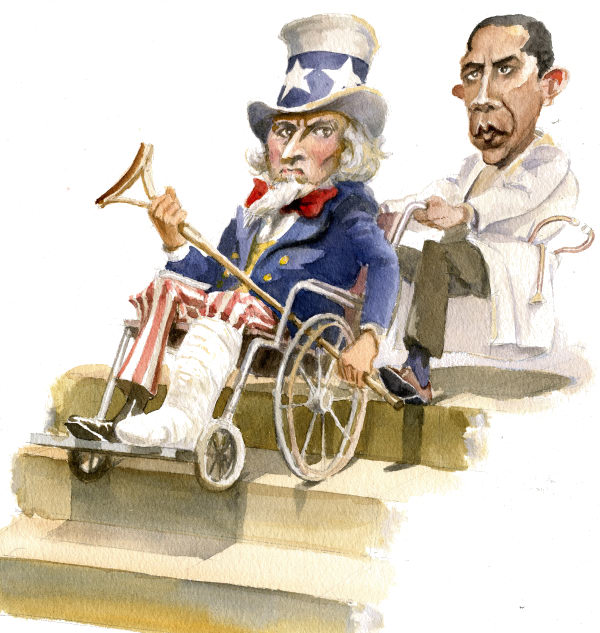
Once again — it’s getting kind of tiresome, isn’t it? — the conventional wisdom, stated with such certainty (including by yours truly) has been proven wrong: despite predictions that the health care reform bill passed by the House and signed by President Barack Obama would get bottled up in the Senate due to Republican attempts to delay or derail it, the reconciliation
“fixes” were passed the Senate today and then passed the House — this time passing the House with four more votes than on Sunday.
America’s long nightmare health care debate is now over re-beginning. The reason: the new of the land with all of its Senate fixes will now become the centerpiece for a long-term struggle which appears to be shaping (as usual) partisan between those who want to build on it, or shrink it or repeal it. The most realistic future battle will be over using it as a kind of skeletal experiment piece so future generations, Democratic and Republican, can tinker with it. But few serious analysts expect it to be repealed.
The Los Angeles Times:
After a final surge to overcome Republican opposition, Congressional Democrats Thursday approved the last piece of their health overhaul, sending President Obama a package of changes to the main health bill the president signed Tuesday.
The so-called reconciliation package, which also includes a major reorganization of the federal student loan program, passed the Senate Thursday afternoon 56-43 on a nearly party-line vote after a grueling night and day of roll-call votes during which Republicans sought to derail the bill.
Later Thursday evening, House Democrats approved the same package 220 to 207 and formally concluded Democrats’ tortuous 14-month drive to move major healthcare legislation through Congress for the first time in nearly half a century.
“More than 80 years ago, Franklin Roosevelt identified four freedoms: freedom of religion, freedom of speech, freedom from want and freedom from fear,” said Sen. Christopher Dodd (D-Conn.), one of the architects of the healthcare overhaul.
“Today in many ways we are fulfilling that last of the great freedoms, the fear that you or your family could suffer a health-care crisis.”
The president, who traveled to Iowa Thursday to tout the healthcare overhaul, is expected to the sign the legislation in the next several days.
The so-called “fixes” bill, approved by a 220-207 vote, now goes to Obama to be signed into law. It makes changes in the broader health care reform measure that Obama enacted Tuesday.
Approval by both the House and Senate on Thursday concluded a tortuous legislative struggle for the health care reform legislation, which received no Republican support in any of the major votes in either chamber dating back to last year.“This is a very proud night in the history of this Congress,” House Majority Leader Steny Hoyer told reporters, adding he expected Obama to sign the measure next week. Thursday’s vote “completes the process of a bill that has been in the making literally for a century, and certainly for decades,” Hoyer said.
Earlier, Senate Republicans forced two minor provisions involving student loan funding to be stripped from the bill — changes that required the House to take up the bill a second time but had no effect on the broader health care bill that took effect Tuesday.
PREDICTION: Senate GOPers will be criticized by conservative radio talk show hosts for not slowing down the bill’s passage even further.
Now the battle immediately shifts into a new area: which party can best explain what the passage means and will mean?
Whichever party makes the best argument will strengthen its hand in the upcoming mid-term elections: if the GOP does a better job, look for Democrats to take the kind of big hit that is being predicted by many analysts.
If the Democrats do a better job, look for the GOP to make gains much less than expected — a development that would accentuate existing tensions and fissures now evident within the GOP.
The copyrighted cartoon by by Riber Hansson, Sweden, is licensed to appear on TMV. Unauthorized reproduction prohibited. All rights reserved.
UPDATE: Roll Call Via Political Wire:
“The package makes a number of changes to the Senate-authored health care overhaul demanded by House Democrats. It dramatically scales back and delays until 2018 a tax on high-cost “Cadillac” insurance plans, strikes some special deals cut with individual Senators, boosts affordability credits, and adds a revamp of the student-loan industry.”
Joe Gandelman is a former fulltime journalist who freelanced in India, Spain, Bangladesh and Cypress writing for publications such as the Christian Science Monitor and Newsweek. He also did radio reports from Madrid for NPR’s All Things Considered. He has worked on two U.S. newspapers and quit the news biz in 1990 to go into entertainment. He also has written for The Week and several online publications, did a column for Cagle Cartoons Syndicate and has appeared on CNN.
















